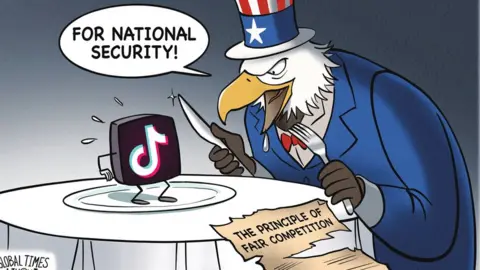
This article is more than
1 year old
The bill in the House of Representatives would force the Chinese-owned app to sever ties with China or become unavailable in the US.
US officials have long expressed concern about TikTok, citing potential national security risks.
TikTok's owners have repeatedly rejected that it poses any threat.
On Wednesday, members of the US House of representatives passed a bill which would require the Chinese parent company of TikTok to sell its US operations.
The bill - officially known as the Protecting Americans from Foreign Adversary Controlled Applications Act - now heads to the Senate, where it is unclear if it has enough support to pass.
If it does, the White House has said that President Joe Biden will sign it into law.
Ahead of the vote, Chinese foreign ministry spokesperson Wang Wenbin accused the US of "suppressing TikTok" despite the fact that it "never found evidence that TikTok threatens national security."
"This kind of bullying behaviour that cannot win in fair competition disrupts companies' normal business activity, damages the confidence of international investors in the investment environment, and damages the normal international economic and trade order," Mr Wang added.
"In the end, this will inevitably come back to bite the United States itself."
The move was similarly pilloried by Chinese media, with several newspapers featuring satirical cartoons ridiculing the US effort to ban the app.

One newspaper, the Global Times, accused the US of "ugly behaviour" and abusing "the concept of national security" to seize the app "by force".
As is the case with other social media platforms, TikTok is banned in China. Users in the country use a similar app, Duoyin, which is only available in China and subject to monitoring and censorship by the government.
TikTok is owned by a Beijing-based, Cayman Islands-registered firm, Byte Dance.
If the US bill becomes law, ByteDance would be required to sell TikTok within six months or face a ban from US app stores and web hosting platforms.
Last week, TikTok distributed a message to many of its American users, calling on them to call their representatives to prevent the government from stripping "170 million Americans of their Constitutional right to free speech."
This, in turn, prompted a letter from the House China Select Committee telling the company to stop "spreading false claims in its campaign to manipulate and mobilise American citizens on behalf of the Chinese Communist Party".
TikTok has denied it has any links with China's government and said it has restructured the company to keep US data in the US.
Former President Donald Trump unsuccessfully tried to ban the app in 2020.
Mr Trump, who on Tuesday passed the delegate threshold to clinch the Republican nomination to become its presidential candidate, is now against the ban, saying it would unfairly benefit Facebook.